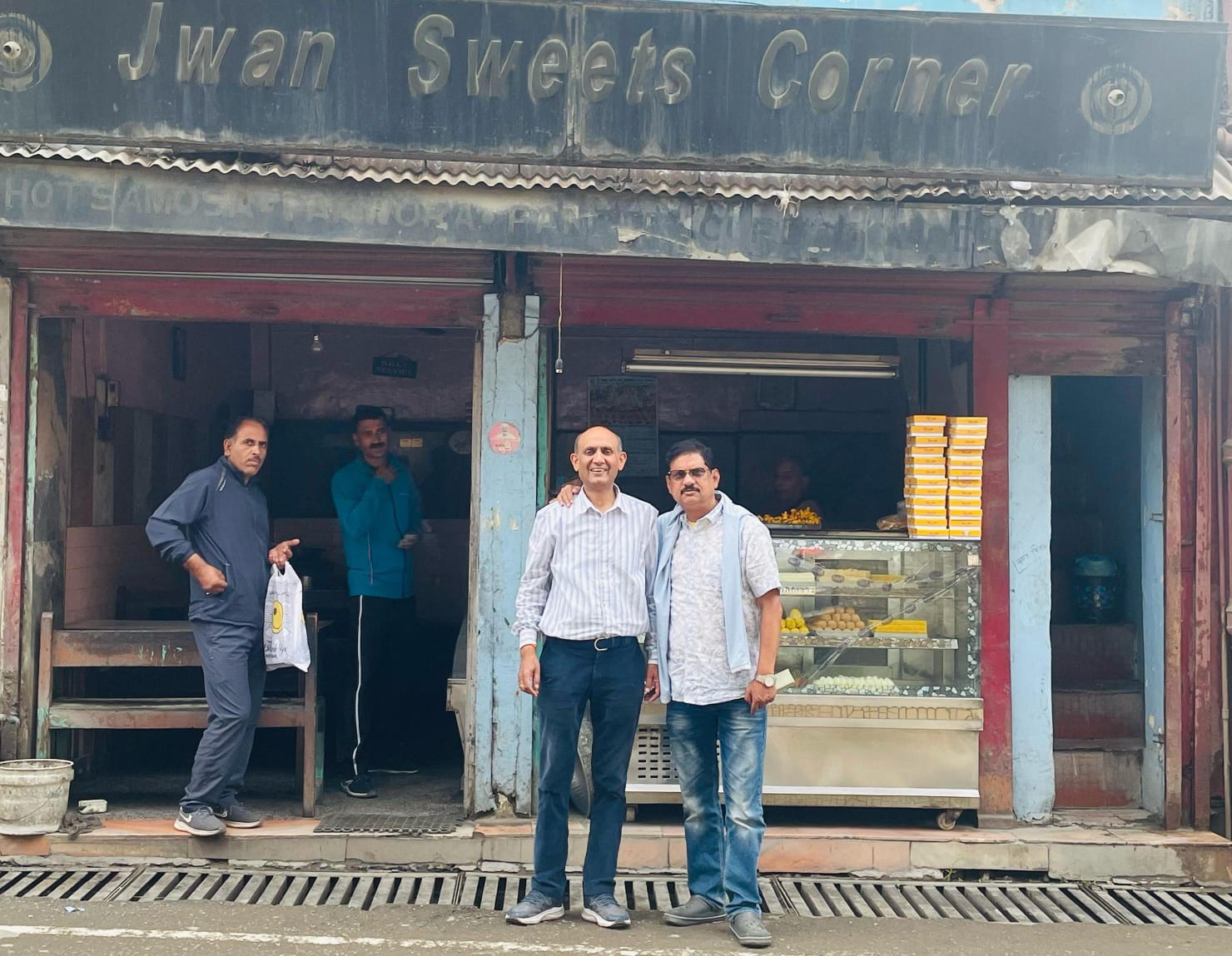“Biswajeet, gana suna!” the girls from my class at Government Degree College, Solan, called out as they sat at Jwan Halwai’s shop.
“Samosa khilao,” I shot back, grinning.
They agreed instantly, and that is how another impromptu musical session began, joined by others who knew the ritual well.
Jwan Halwai’s shop on College Road was not just a snack joint—it was a slice of our youth, a place that still lives in the folds of my memory. A place I visited recently, after 45 long years. Back then, it was the soul of our college life. We chatted endlessly over piping hot samosas and sweet tea, discussing everything from gossip to heartbreaks, love affairs to latest crushes.
I used to live on Power House Road, near the old Sundar Cinema Hall, and the shop was almost the halfway point between our college and home. It stood right near a trifurcation—where we friends would part ways, each walking towards our homes. For students like us, Jwan Halwai’s shop was more than a pitstop; it was an iconic landmark.
Today, the shop still exists—but it bears a new name: Jwan Sweet Shop. The once solitary structure now sits squeezed among rows of new shops and bustling complexes. More traffic, more noise—life here has picked up pace, but somewhere the quietude of the past has faded.
Inside, things have changed too. Gone are the small, cozy wooden partitions that gave ‘lovebirds’ their stolen moments of privacy. The space has been redesigned into a single hall with neatly arranged benches and tables. But if the heart of the shop has transformed, its soul—the samosa and its killer chutney—remains untouched. That crisp, golden samosa dipped in their signature spicy chutney still tastes like the 1980s. Nostalgia has never been more delicious.
As I bit into one, the memories came rushing back. College life in Solan in Himachal Pradesh was one of the best chapters of my life. It was a time of carefree laughter, unwavering friendships, harmless teasing, and standing by each other in times of crisis.
I used to call a friend Chuha, and a girl in our class Moti. No one took offense. Chuha, in turn, used to call me Bangaley. That easy-going chalta hai attitude was the glue that kept us together.
I remember a day in Botany class. My partner-in-crime, John (Manoj Jain), and I were backbenchers. While the teacher was facing the board, drawing a diagram, we softly started singing “Dil ka haal suney dilwala.” As soon as she turned back, we went silent. And again, the moment she resumed drawing, we resumed singing. Giggles spread across the class.
When she turned once more and caught on, she thundered, “Who is this?!” A pin-drop silence followed. When she turned again to complete the diagram, we resumed our serenade. That was the final straw. She slammed the chalk down and stormed out. “I will not teach this class!” she declared.
That silence afterward was heavier than the Himalayas. All eyes turned toward me. A classmate, Archana, whose father was an English professor in the college, could easily spill the beans. We pleaded with her to keep our secret. Thankfully, the class monitor pacified the teacher. She returned the next day—and we breathed again.
For all the mischief I did, I also had my share of unforgettable embarrassments. One such incident was so memorable that I even shared it during a guest lecture at Lucknow University.
Although I studied in Government College Solan for just about a year—before my father, then the Chief Medical Officer, was transferred to Nahan—I frequently returned to visit my friends Bittu (Sudhir), Bhola (Anil), and John (Manoj).
On one such visit, I was wandering around the college campus with Sudhir and Anil when a voice called out, “Biswajeet!” I turned to see a former classmate waving at me.
“Pehchaan nahi raha hai kya?” she asked.
I stopped to talk to her near a corner of the verandah while Anil and Sudhir waited a little distance away.
Just then, a young man walked up nervously to her and said, “Main aapse friendship karna chahta hoon.”
I was stunned—not by the audacity of the proposal, but by its timing. She was clearly mid-conversation. I do not remember exactly what she replied and the boy went, but from my expression, she must have sensed my awkwardness. She continued speaking to me, unbothered.
Later, when I recounted the episode to Anil and Sudhir, they burst into laughter.
“That boy knew you were an outsider,” Anil said, still chuckling.
Sudhir added, “Woh yeh bhi jaanta hoga ki woh ladki tujhse patne wali nahi hai. Tabhi try kar gaya!”
Before I could respond, Sudhir threw his arm around my shoulder and said, “Chal, Jwan ke samosey khaate hain.”
As we reached Jwan Halwai’s shop, the same girl was sitting there with her friends. She looked up, smiled, and asked, “Tu samosa khayega?”
We laughed, three of us joined their table, and for a while, it felt like no time had passed at all. The same banter, the same warmth.
Some places do not age; they mature with memory. For me, Jwan Halwai is one of them. A monument of moments, sealed forever in the laughter of youth and the taste of a perfect samosa.

Hmmm hum jaantay thei bhai parhai kar raha hai par jawaan halwai ka pata na tha.
Par Dadabhai, Jwan Halwai to college aur ghar ke bheech mein tha na. Hum log apne aap ruk jaate the
Quite interesting! Did you meet any girl this time?
Nahi sir, itni kismat kahan